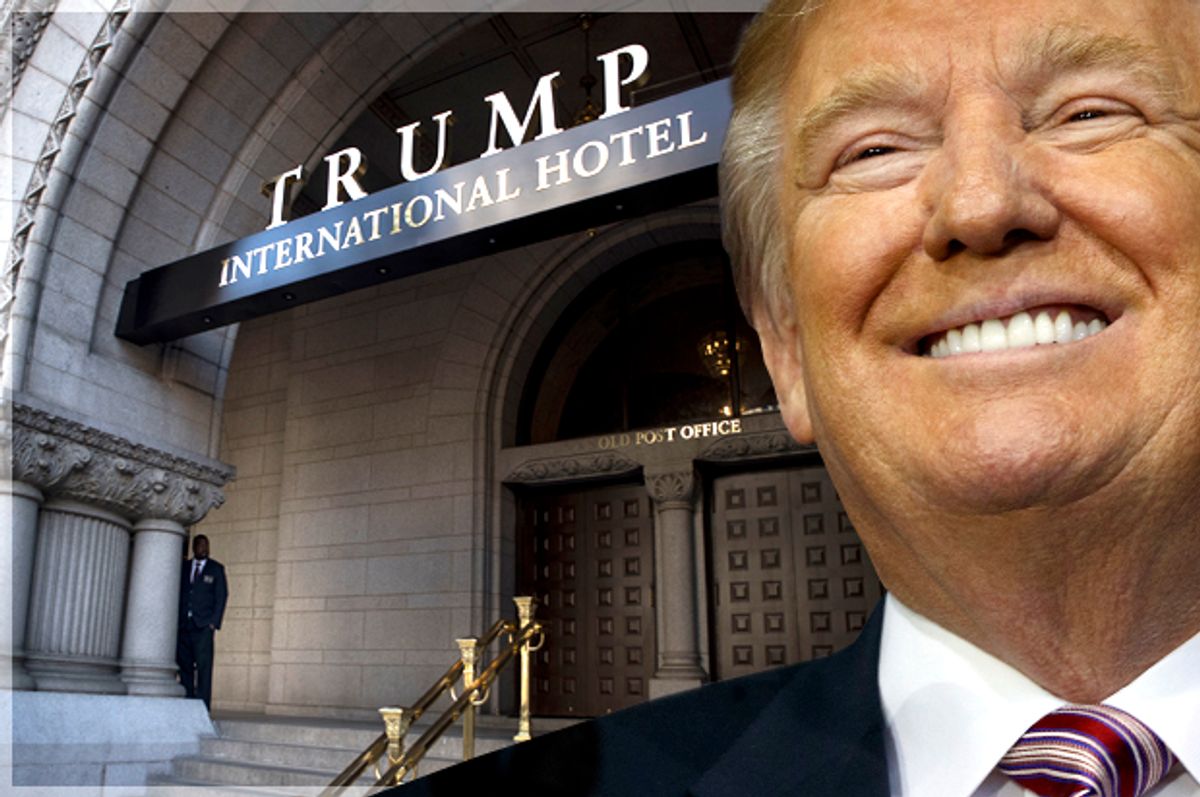Before President Donald Trump took office, he made several promises about how he would not profit from his presidency or allow his policies to be influenced by outside money. He even pledged to fully remove himself from potential conflicts of interest while in office. But more than one year into his presidency, Trump's past business empire has proved too complex, presenting an unprecedented number of ways in which he continues to pocket substantial financial gains.
A recent Associated Press investigation highlighted the many different ways in which Trump has been able to circumvent his ethics pledges:
An Associated Press analysis of the promises Trump made to draw a “red line” between his businesses and his administration found that, while he has kept to the letter of many pledges, he has exploited the vague language of others, creating at least the appearance that he’s profiting off his presidency.
Trump has removed himself from positions at roughly 550 Trump Organization entities, in over 20 countries "but the changes appear to be more cosmetic than substantive." He placed his assets in a trust, which his own lawyer confirmed he can pull money from at any time he wants to, and handed over his empire to his two sons, Eric and Donald Trump Jr.
One pledge Trump has not so much as even attempted to make good on has been his pledge to donate profits from any foreign governments staying at his properties to the U.S. Treasury. Since the start of his presidency, "Trump Organization has taken in more than $600,000 from dozens of political organizations, companies, foreign governments and officials using its hotels and resorts," the AP reported. That money comes from "Saudi government officials, the Malaysian prime minister, two pro-Turkish groups and the Kuwaiti ambassador."
There has not yet been a single payment made to the Treasury.
Trump Organization has also landed dozens of trademarks in numerous countries since Trump has become president, but the conglomerate has argued those trademarks were applied for prior to Trump taking office, the AP reported. Ethics experts have argued it makes little difference.
"These are meaningless lines being drawn," Larry Noble, general counsel with the Campaign Legal Center, told the AP. "The point is, they’re interacting with foreign businesses and foreign governments by doing that. So virtually all the potential conflicts you get with a new business you get with an expanding business."
Trump has also doubled the membership fees at his Mar-a-Lago club in Palm Beach, now at $200,000. He has also spent one of every three days of his presidency at a private property of his, which have also received copious amounts of free publicity. The office of the presidency has been used for free advertising, as he or staff has mentioned his private properties "at least 35 times in tweets and public comments," the AP reported.
Even the cost of U.S. Secret Service being used at Trump resorts "eventually goes into Trump’s pocket," and there is no known record of how much money those expenses have cost taxpayers.
"My overall ethics grade for the Trump administration is an F," ethics lawyer Kathleen Clark of Washington University School of Law told the AP.
It's quite obvious that the president's conflicts of interest from his past private business life are vast, secretive and still very much prevalent today. The conflicts have provided ample opportunity for him and his businesses to substantially increase profits. The prospect that Trump can co-opt the Oval Office in order to grow his personal wealth is corrupt and a problematic precedent to normalize.



Shares